Just before Christmas came around, Liv Boeree sat down with the comedians from the Triggernometry Podcast. In someone's living room, Konstantin Kisin and Francis Foster fired off questions related to poker, AI, game theory, and life strategies.
Liv Boeree won €1.25 million in the European Poker Tour, bringing overnight international fame to the English player from Kent. By the end of her poker career, she amassed over $3.8 million in live earnings and won a World Series of Poker bracelet. She quit the sport and went on TED Talks, co-founded a charity, and started the Win-Win podcast, which deals with competition strategies in daily life.
Liv also thinks the alien found by the Mexican government isn't real and you can use poker pot odds to park illegally (though she doesn't recommend it).
Podcast Highlights:
– One thing that I really wanted to talk to you about Liv is poker, and in particular, poker strategy. Firstly, how did you get into poker? You studied astrophysics at university and then you became a poker player – are those connected? Is it mathematics?
– Oh, it was very, very random. I graduated and really didn't want to get a real job. I was trying to do anything I could and I started applying for game shows in the UK.
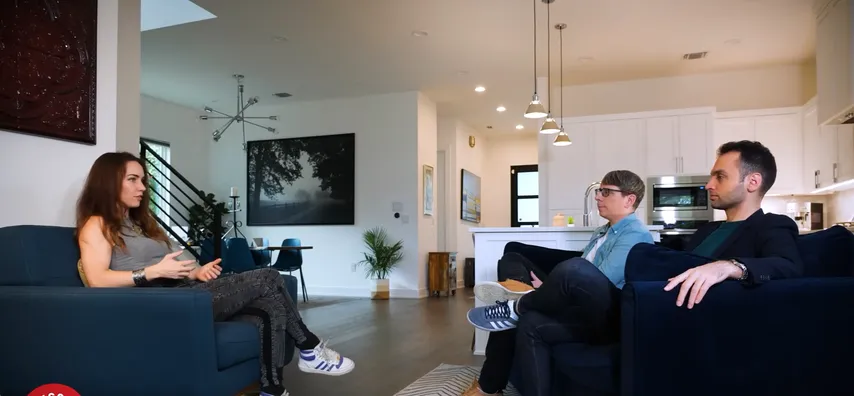
– What type of game shows?
– Any of them that would accept me. I was on Golden Balls and Codex with Tony Robinson. That was great. They locked you in the British museum overnight and you had to solve all these clues.
The first show I got on, was one that said could you use your powers of skill and deception to win £100,000. “That's a lot of money, yes please!” So yeah, I got selected as one of the five contestants and then they did this big reveal that they were actually going to teach us how to play poker.
The loose premise was like, which personality type is best suited for the game, and I was the “Professor”, as they called me. I didn't win the show, but I just absolutely fell in love with the game. You know, at the time I was really into metal music and wanted to be a sort of be a rockstar and I was like “Oh wait, this is probably easier in many ways,” because I wasn't that good at guitar. Like, I wanted to travel the world basically and live a very ridiculous life and poker seemed like a fun way to do that.
– Wow, okay. So, how much of it is luck how much of it is strategy in order to become a good poker player?
– So, it depends on the time horizon you're talking about. If the three of us sat and played for half an hour, it's basically all luck – assuming you know roughly how to play. But if we played for a week, I'm going to win probably 98% of the time or something like that. Again, I don't know how good you guys are maybe one of you is very good.
– No, no. I think I think you underestimate your success rate in that scenario. It would be closer to 100%.
– Right, so basically, there's there's a lot of luck. In any given hand there's a lot of luck and randomness because the deck is shuffled between each hand. You can't control what cards you get, but the more you play, the more decision points there are and the more any edge that the better player has accumulates.
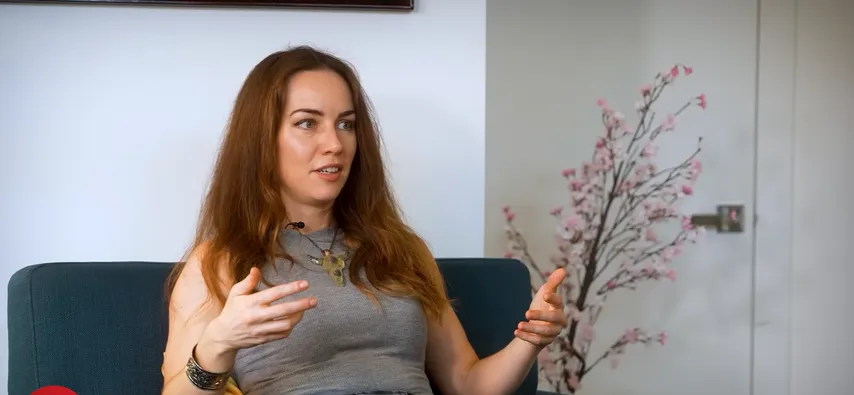
– And how much of it is about reading people's emotional cues, tells, etcetera?
– Put it this way: the best poker player on earth is the most analytical nerd you could imagine because it's an AI. It's an AI that doesn't know human emotion; it doesn't read people in that way; it's just so good at calculating the game theory, the Nash equilibria, It is so good at that, that it is able to beat the very best humans on Earth, consistently. If they were to sit and click buttons against this thing for Infinity, this thing would crush them. So what that says is that the game really at its core is a game of maths.
– Wow…
– Yeah. Now, that's not to say that there isn't this like, level of meta-information that you can use and what's interesting is how the games changed.
When I first learned to play, and certainly like the decade before like in the '90s, the best players in the world were like these like old school hustler-type guys. You know, like the classic guys in the casino with the cigar. They would make these sort of inspired intuitive plays that they couldn't even explain why they did them – they just had really strong gut feelings and their gut feelings were really like really accurate, at least more accurate to everyone else, so that's why they were so good. As, you know, the game moved into online poker more and we started having more data basically to synthesize and analyze, then we started building software to analyze that data the game became more and more of a science and less of an art. It’s sort of trended towards this very mathematical style.
The very best players these days know how to do both types. They are very mathematical, they understand all the game theory, but they're also great readers of human behavior. Those are the very best players, but still, technically, they would lose to the machine. That's how good it is.
– How useful is that ability to read other people in poker in normal life? Can you tell what we're thinking now?
– No, I can't tell what you're thinking.
What you're really looking for is figuring out what someone's baseline behavior is when they are not doing the activity. So they're not in a poker hand or they're not in a negotiation. Are they a naturally relaxed person or are they quite tense? Are they extroverted, introverted, etc., and then, you want to see how they deviate from their baseline when you're actually in play.
So, some people are naturally very intense when they're playing and all of a sudden they become languid or something. That can be sometimes some relevant information, but the trouble is that fear and excitement present themselves very similarly. So, that's a real tricky one if we're playing and you go all in to put me to the test and I can see your heart is going and you're breathing fast and your mouth is clearly dry – that could be excitement or fear.
One little thing I found helpful is sometimes to like, make someone sit there and sweat it for a few minutes. Like, pay attention to how they are after 3 minutes or 2 minutes – however long I can stretch it out for. If they are excited you know if they have a good hand typically that excitement will wane. They've made their big action and now they're just waiting to see what you do and there's nothing more they have to worry about, so they'll typically calm down. But, if someone is bluffing and their heart's still going after 2 minutes you know they're still very very stressed. So that can be one way of discerning, but again, the main thing is that there's no one size fits all. You just have to be... it's something that you really can't explain. People just have to gather through experience.
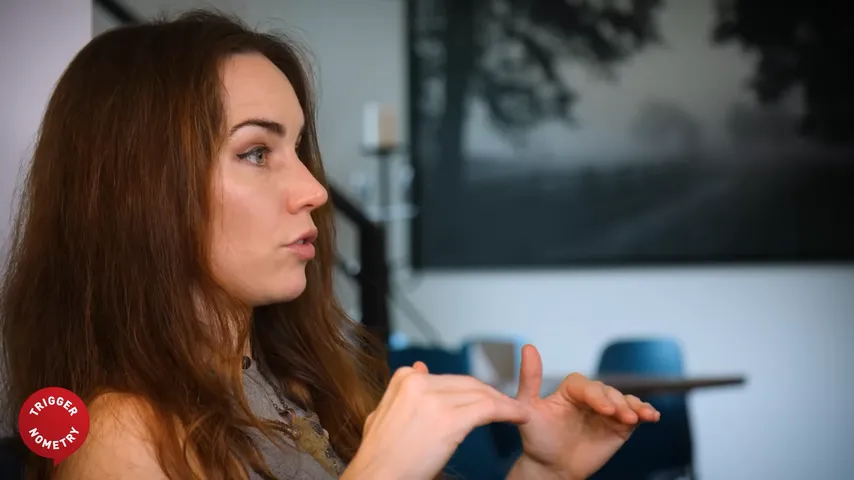
– I was going to say Liv, how does mathematics work with poker? You get given your hand and how do you discern what the best play is with your hand? Obviously, you don’t know the hands of other people.
– Right, so it's all about this poker concept called ranges. We're going to get quite specific here. So you're playing Texas Holdem and you get two cards out of a deck of 52. There are 1,326 possible combinations of two cards that you could get. I hope those numbers are right it's been a long time. if they're not, they're not. I'm pretty sure that's the number.
So, to begin with, you know I have two cards, which is one possible combination out of 1326. So right now, my range is 100% uncertainty to you – but then let's say you raise and I now re-raise. Now you can narrow down that range because I'm probably not going to be re-raising with like, let's say, the bottom 40% of of those cards. There might be some, but as the hand progresses your job is to try and extract as much information out of me as you can, while at the same time, giving as little to me as possible. I'm trying to do the same thing, right? So you're trying to narrow down the range of cards your opponent could conceivably have, by putting them to the test or seeing how they behave, while keeping the range of perceived cards that you have as wide as possible.
So that's what you're trying to do in fundamental terms and then there's mathematics you can do within that. Let’s say I bet 100 into a pot of an existing 100. So now, you have to call 100 to win 200, so you're getting two-to-one. Now you can see this stuff called pott odds and then like these combinator combinatorial, um, calculations you can do to see if you're getting the right kind of price. I won't go into the minutia of that, but that's the kind of stuff.
When it comes to poker theory, Liv knows what she's talking about and even spent time as an ambassador for PokerStars.
– So there’s a real strategy behind it. Has that helped you to strategize in life, and also, what are the best poker strategies that you can take for real life?
– Tip #1: One of the main things poker teaches you to do is to be comfortable with uncertainty. Be comfortable with seeing things probabilistically, which actually brings us full circle, back to the issue that we have with today's modern media. We don't know what's quite true. You'll see something like, “Oh, they found aliens!” You know, the Mexican Congress and this alien shape. Well, what's the likelihood that it's real? Okay, that's maybe a silly example because that was pretty obvious that it was not real, but you know, some of these things, you truly can't know and you might never find out what the truth is.
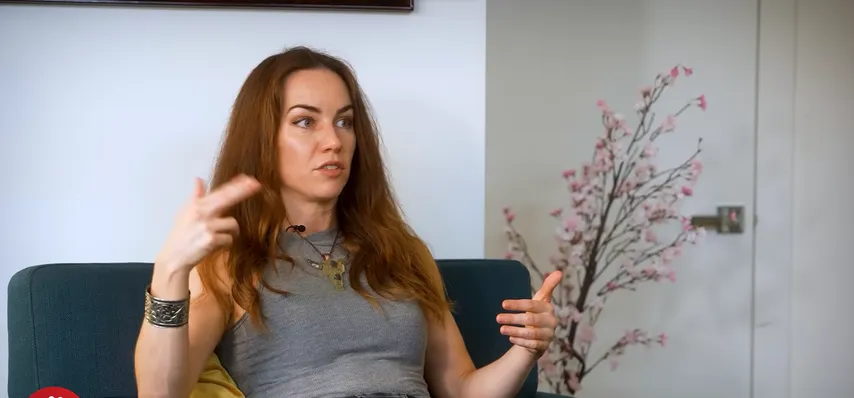
So what poker teaches you is to be like, “Okay, well, I feel like 30% of the time they have this kind of hand and then 40% of the time this and then 30% of the time they have that,” or whatever. You're very used to thinking about things probabilistically and with this, like, grayscale. That's the most useful skill – by far – because, I mean even things like deciding whether to park illegally somewhere (not that I would advocate that), but you know, you're running late for a meeting. I don't want to get a parking ticket but I don't want to be late for my meeting. What I would do is go, “Okay well what's a probability I'll get a ticket while I'm parked here?” It's probably like half an hour so it's probably only like 10%. How much is the ticket if I get it? It’s $100. All right, so that's an expected loss of $10. Would I be willing to pay $10 to park right now and be on time for my meeting? Yes? Okay, I'll park.
You know that's the kind of thing. These expected value calculations, which you don't learn in school and they're so useful, they're so important. So yeah, living with just grayscale and probability is probably the number one thing.
Tip #2: The next thing is learning how to like deal with luck and randomness. One of the hardest things in life is when we have a big success at something; is it because we did a really good job, we're just better than everyone else, or was it more because we got lucky (or some combination of those two).
I won very early on in my career, this huge tournament, this European Poker Tour Tournament, and for the next six months, because it was such a big tournament, I got so much attention for winning it. I just assumed I was God's gift and I stopped studying the game as hard, I started playing in bigger tournaments, like riskier tournaments, and my win rate just absolutely plummeted to the floor and that's because I got fooled by randomness a little bit. I obviously did a lot of stuff right to win that tournament but I also had so much luck on my side. Our egos have a tendency and we like to take credit for our successes and outsource blame on luck. You know, “I just got unlucky,” when things don't go well and poker teaches you to basically be honest with yourself you have to be epistemically humble and like really scrutinize. You know, okay what you know what was the cause of this? Was it because I was I did things right or because I got lucky? Therefore, it trains you to be more focused on the process as opposed to the outcome and results. If you develop a good process that's kind of agnostic to whether luck is on your side or not, then that's the benchmark you should measure yourself against.
Tip #3: The third one is, don't over-privilege your intuition in situations where your intuition is not best suited. Again, if I was playing and my brain wasn't working well and I couldn't think through all these combinations and so on, I'll just go with my gut.
After 15 years of playing, my gut was fairly reliable, but certainly for the first 5 to 10 years of playing, my gut was not very good. I would often use my intuition as an excuse to just not do the boring number crunching and I've noticed that's a trend that seems to be widespread in the world. You look at these memes online, if you search for “intuition”, everything the internet says is like, “Oh, trust your intuition 100% of the time – it's always right,” and that's just wrong. You know, after even 15 years of playing poker and thinking I have great intuitions, I would still have an error rate. I'd be so sure that someone was bluffing me and then it turn out that actually they had a really good hand – but my gut was screaming “Call, call,” and it was wrong. So that's the other one.
Be careful of over-relying on intuition and instinct in situations where really, you just need to do the boring number crunching.
– It's such a powerful message because so many people make decisions that are emotional, not based in rationality, and then it turns out that they're terrible decisions.
– If you're just doing stuff purely on instinct all the time you can't go in and then scrutinize what your thought process was. At least, if you're doing something logically, you can look back at it and go, “Okay, that's probably where my bias and my emotion clouded this bit”. But when it's like, pure intuition stuff, it's a black box. You don't know what's going on in there and they're still vulnerable to to emotional bias and that kind of stuff. I don't know, I wish I had like a clean answer.
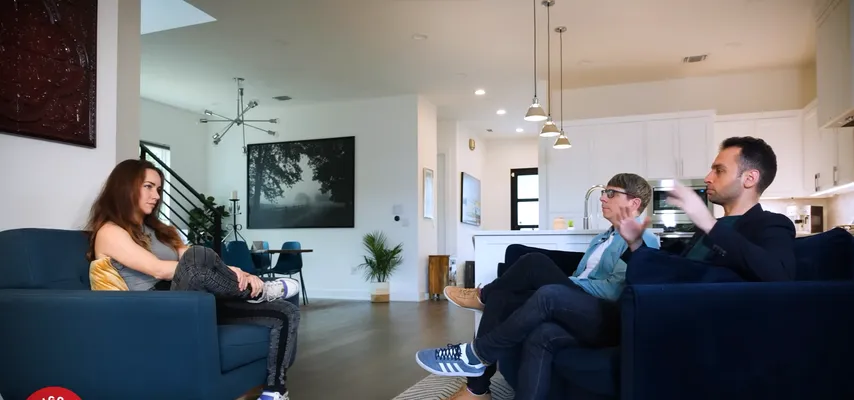
– It was a clean answer. I'm curious, is it possible to control your own tells?
– I should caveat this. I quit poker like four years ago you know, properly now. I'm not sure what the latest strategies are that people are doing. I would practice. It's not like I would sit in front of the mirror or anything like that because I would watch videos of myself. You know, if I played a final table I would then go back and watch it afterward if it was televised to see, “Oh okay, so this is how I was behaving there. Good to know that I'm gulping a lot when I was running a huge bluff.”
A good poker face doesn't have to be deadpan. It's just something that is natural to you. Some people are naturally very animated, so you just want to train yourself through exposure therapy of being in these stressful high-stakes situations. The more you're in them, the less you're going to have the flight or fight response, so that's really the training you can.
You know, you can't train your poker face for a huge final table until you've actually just been there and done it and felt how it felt and dealt with all the physiological annoyances that your body throws at you.
– I did Question Time (a BBC game show). I was completely calm on my way there, calm when we got there, did the warm-up, and then when it came to to the actual show, I suddenly couldn't move my body for like 5 minutes. The second time you do it, you are actually relaxed.
– I do a lot of public speaking these days and I still get incredible stage fright each time. I did just for the first time try beta blockers, which are meant to help slow down the heart rate and so on to help with the physiological symptoms and they did actually really help. So, I kind of wish I'd discovered these long ago when I was playing poker. Yeah, there's a lot of variation between people. Practice obviously helps, but I learned to accept that I'm just always going to have a high heart rate when I'm stressed and that’s just how my body responds.
Get comfortable with the fact that you are going to be stressed sometimes. The worst thing you can do is be stressed about being stressed.
– What’s the biggest amount of money you’ve won in a poker tournament?
– It was that European Poker Tour, yeah, it was 1.25 million euros.
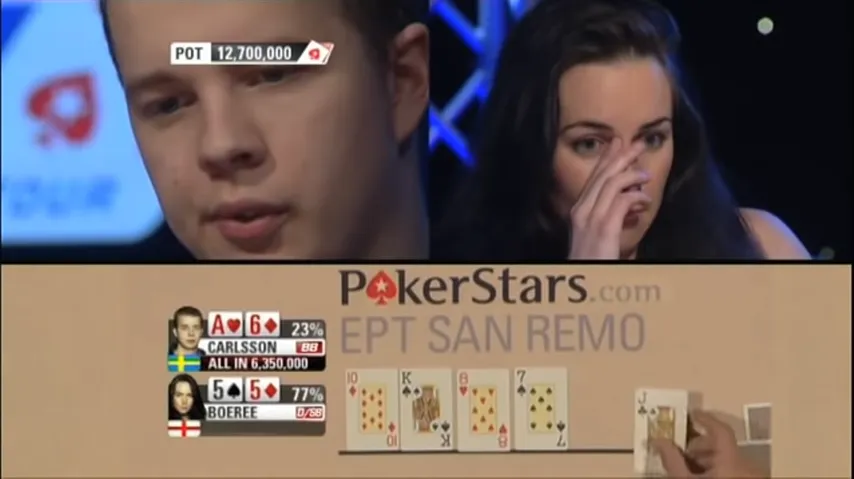
– Incredible!
– It was a good week. I was 25.
– You were 25? Thank god you weren’t a 25-year-old man!
– I was pretty reasonable um I bought a flat in London and then put a bunch of it back into poker.
– Did you think, “This is it now, I'm going to be winning like this every few months or every week.”
– I thought I was God's gift.
I didn't do anything too nuts in terms of lavish spending. After winning that, the British press (speaking of tabloids) got a hold of it. Daily Mail turned up at my parent’s house. My mom didn't know, so she let them in. They were taking photos of my childhood pictures, they’re all on there (online) now. I was on the front page of a bunch of tabloids that week. I don’t know quite what their angle was. I guess it was just like I was a young cutish girl who had an interesting story.
That was the highest high that week. Talk about about dopamine spikes, my God. Then it all sort of settled down and I think I probably had like a big crash as well. I remember wanting that taste of fame. That was definitely a thing. There was a part of my brain that wanted to get back to it. I was like, “Okay well I need the next win so I can keep that going,” and then when it didn't come as easily. That was interesting to adjust to.
– Why did you stop playing poker?
– In the end, a combination of things. The game has gotten so much harder, really, so much harder. AI – big part of that – Online poker is basically done for high-stakes money. You can play low stakes or whatever and that's fine, but because you can now have an AI that is playing effectively in real time that's far better than anyone else, there's incentive for people to cheat and use them. So there's that, and then also, the average player is just so much better than they used to be because all this like strategy information has been very democratized. These tools are very easy for anyone to work with now, so the average Joe is just much better at poker. Then thirdly, I just kind of got bored of it as well. I've been doing it for a long time and felt various forms of itchy feet. Also, it's like the ultimate zero-sum game, by definition. I felt like I should probably do something else than just that for the rest of my life that's a little bit more positive and a bit more win-win.
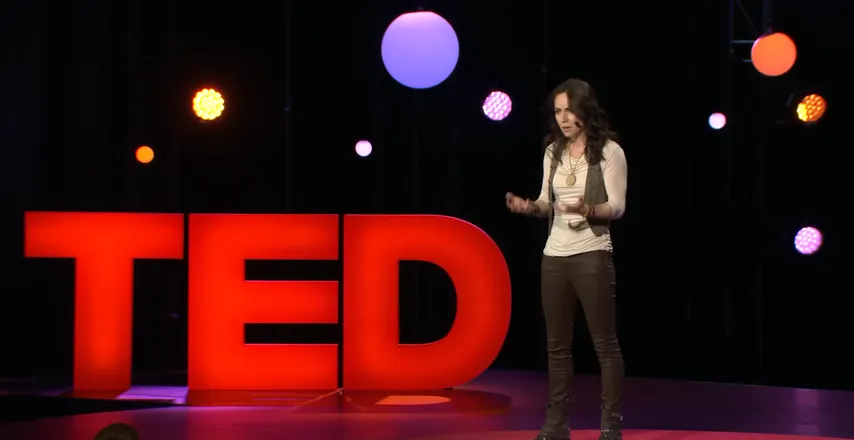
– And plus, you got a taste of the sort of celebrity and now you make content!
– Now I'm one of those people! I really believe in the content that I'm making – let's put it that way.
– That's a good reason to make content.
– Explaining these concepts of like, bad Game Theory, like competition gone wrong in society. Get more people thinking about it to like, hopefully, hive-mind a solution to this. That definitely feels you know like my my calling. I hate that phrase.
– Why do you hate that phrase? Is it because you’re British? Because here Liv catching up with poker player Bill Perkins, everyone’s like, “It's my mission!”
– I really really believe in finding ways to defeat Moloch (Multipolar Trap) and I think this is my best way of doing that. I seem to be good at making these little films about it and I've not to Pimp My Podcast too much, but I just launched this podcast called Win-Win which is about finding win-wins in seemingly win-lose situations.
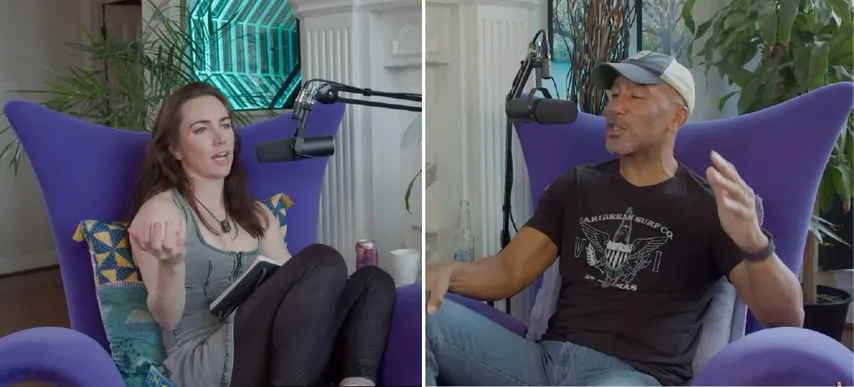
– What's the one thing we're not talking about as a society that we really should be?
– Whether you want to call it “Molock,” coordination problems, multi-polar traps, inadequate equilibria, whatever word means the most to you – these forces of um short-term incentives that are misaligned with what the world actually needs and are creating these race-to-the-bottom spirals within industries or within little sections. We aren't talking about like The Meta level stuff you know the actual fundamental structures of these systems, sufficiently. Everyone's just too busy pointing fingers, going, “You did that, therefore you're bad.”
Basically, don't hate the players, hate the game, and think, how do we fix the game? That’s what we're not talking about.
– Liv Beoree, thanks for coming on.





